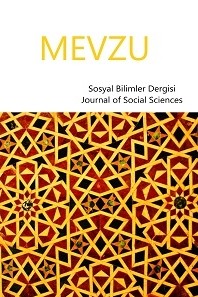13. Yüzyılın Latin Ortaçağ’da Aristotelesçi Akıl Öğretisi ve Latin İbn Rüşdcülüğü Üzerine Felsefî Bir Değerlendirme
Bu makalede 13. Yüzyıl Latin Ortaçağda Aristotelesçi Akıl öğretisi İbn Rüşd esasında bir değerlendirilmeye tabii tutulmuştur. Bu çerçevede özellikle Latin İbn Rüşdcülüğü olarak bilinen felsefî akım ele alınmıştır. Filozof İbn Rüşd’ün Aristoteles’in eserleri üzerine yaptığı şerhlerin Latin Ortaçağ’da tanınmasıyla din-felsefe çatışması mecrasına kayarak tartışılmaya başlanan “akıl” kavramı, farklılaşan okumalarla teolojik ve politik bir veçhe kazanmış görünmektedir.
Anahtar Kelimeler:
Akıl, Aristoteles, İbn Rüşd, Latin İbn Rüşdcülüğü; Thomas Aquinas
Aristotelian Reasoning in the 13th Century Latin Medieval Age and a Philosophical Assessment on Latin Avicenousness
In this article, Aristotelian Intelligence in the 13th Century Latin Medieval Era was evaluated on the basis of Ibn Rushd. In this context, the philosophical movement which is known as Latin Averroism is discussed. The concept of reason, which has begun to be discussed by the philosopher Ibn Rushd in the Middle Middle Age through the recognition of the annotations he wrote on Aristotle's works in the Middle Ages, seems to have gained a theological and political aspect with differentiated readings.
___
- Alighieri, D. (1963). La vita nuova; La divina commedia = Das neue leben; Die göttliche komödie. Darmstadt : Der Tempel Verlag Gmbh.
- Arnulfus. (1988). Divisio Scientiarum. Içinde C. Lafleur (Ed.), Quatre introductions a la philosophie au XIIIe siecle: textes critiques et etude historique.
- Averroes. (1560). Metaphysik XII (XI) (Venedig, ed.).
- Çüçen, A. K. (2001). Ortaçağ Felsefesi Tarihi. İnkılap Kitabevi.
- Dönmez, S. (2009). Aklın Birlikten Çokluğa Yolculuğu. Birleşik Dağıtım Kitabevi.
- Gauthier, R. A. (1982). Notes Sur Les Débuts (1225-1240) Du Premıer “Averroïsme”. Revue des Sciences philosophiques et théologiques, 66(3), 321-374.
- Gauthier, René A. (1982). Le Traıté “De Anıma Et De Potencııs Eıus” D’un Maître Ès Arts (Vers 1225): Introductıon Et Texte Crıtıque. Revue des Sciences philosophiques et théologiques, 66(1), 3-55.
- Gauthier, René Antoine. (1984). Notes Sur Sıger De Brabant: Iı. Sıger En 1272-1275 Aubry De Reıms Et La Scıssıon Des Normands. Revue des Sciences philosophiques et théologiques, 68(1), 3-49.
- Grabmann, M. (1966). Kaiser Friedrich II. und sein Verhältnis zur aristotelischen und arabischen Philosophie. Içinde S. Mundi (Ed.), Zur Geschichte Friedrichs II. von Hohenstaufen.
- Darmstadt. Hasse, D. N. (2007). What did the Latin translator do with Averroes’ Long commentary on the Metaphysics? Içinde XII. International Congress of Medieval Philosophy. Palermo. http://www.bbkl.de/t/tempier_e.shtml. (t.y.). Isidore, of S., Saint,-636. (1486). De summo bono. Louvain: Johannes de Westfalia.
- Kurt, F. (1989). Einführung in die Philosophie des Mittelalters (2. bs). Darmstadt.
- Küken, A. G. (1996). İbn Rüşd ve Saint Thomas Aquinas felsefelerinin karşılaştırılması : Doğu-Batı felsefi etkileşiminde. İstanbul: Alfa Basım Yayım.
- Lafleur, C., & Université de Montréal. (1988). Quatre introductions a la philosophie au XIIIe siecle: textes critiques et etude historique.
- Magnus. (1962). Liber de animalibus: von Falken, Hunden und Pferden. Içinde Deutsche Albertus-Magnus-Übersetzung aus der 1. Hälfte des 15. Jahrhunderts. Eingeleitet und herausgegeben von Kurt Lindner. Quellen und Studien zur Geschichte der Jagd, Band 7 & 8. Teil 1: 231 s., Teil 2: 210 s. de Gruyter. Berlin.
- McInerny, R. (1993). Aquinas against the Averroist. On there Being only one Intellect. Indiana: West Lafayette.
- Yayın Aralığı: Yılda 2 Sayı
- Başlangıç: 2019
- Yayıncı: Ali SEVER
Sayıdaki Diğer Makaleler
Karanlık Viktorya Döneminde Dickens'ın Mumları: Christmas Books eserindeki Ortak Semboller
Atatürk Dönemi İmam-Hatip Mektepleri Üzerine Bir Değerlendirme
Siyasi ve Hukuki Açıdan Milli Mücadele
Osmanlı Milleti Oluşturma Projesi ve Türkleşme Teşebbüsleri
Ebu'l-Berekat el-Bağdadi Felsefesinde Tanrı Kitap incelemesi
